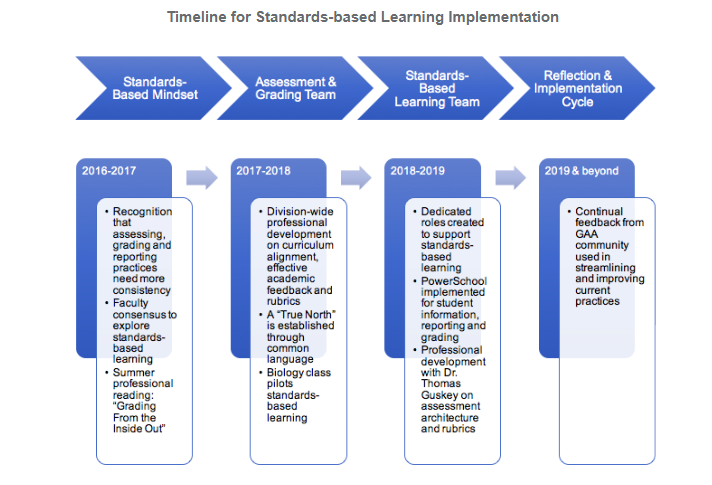
Standard-Based Learning
A grade has one purpose: to communicate a student’s learning. Standards-based grading is designed to do just that.
Standards-based education refers to systems of instruction, assessment, grading, and academic reporting that are based on students demonstrating understanding or mastery of the knowledge and skills they are expected to learn as they progress through their education. These are collectively known as standards - concise, written descriptions of what students are expected to know and be able to do at a specific stage of their education.
In schools that use standards-based approaches the standards are used to determine the goals of a lesson or course. Teachers then determine how and what to teach students so they achieve the learning expectations described in the standards. At GAA, curriculum standards are defined for each course and specifically indicate what the student is expected to learn and demonstrate on assessments.
Throughout each course, the completed assessments help the teacher provide feedback and learning targets as well as track progress toward proficiency of each curriculum standard. When assessments target multiple curriculum standards, a proficiency level is determined for each one. Our proficiency levels are Mastery, Proficient, Developing and Emerging.
What is Standard-Based Learning?
-
Approaches to Learning
The six Approaches to Learning (thinking skills, collaboration skills, reflection skills, communication skills, self-management skills and research skills) encompass the key values and principles at GEMS American Academy. Through these Approaches to Learning (AtLs) students develop skills that have relevance across the curriculum that help them “learn how to learn”. AtL skills can be learned and taught, improved with practice, assessed, and developed incrementally. They provide a solid foundation for learning independently and with others.
Approaches to Learning are reported separately. These AtLs are noted in the gradebook and on report cards for parents to see, but do not factor into letter grades or GPA.
-
Our Path
One of the most prominent topics of discourse in education is effective grading practices. In 2016-2017, GEMS American Academy identified the development of effective grading practices as our next step in our continual commitment to improve the learning for each student. This led us to where we are today: a standards-based learning environment.
In the second half of the 2016-2017 school year, the Secondary School at GAA collectively inquired into the true meaning of assessment. Using research from renowned educators, such as Tom Schimmer, Thomas Guskey, and others, we began to create a meaningful and intentional philosophy of learning.
In the year to follow, the 2017-2018 academic school year, a specific Assessment and Grading Team was put together with educators from all subject areas. The goal was to create a ‘true north’, or common understanding of learning and assessment. Throughout the year, all teachers were using their standards-based mindset to critically and creatively adapt their teaching practice. Their successes were shared and a common vision became more clear.
In the 2018-2019 school year, our Secondary division established a new structure of support for the GAA community including a Standards-Based Learning Team and professional development with Dr. Thomas Guskey. With our newly adopted online grading and reporting software, students, teachers, and parents are able to see how a student is achieving - at any moment of the year - with much more detail than ever before.

-
Frequently Asked Questions
For more information, please see our “Standards-Based Learning Frequently Asked Questions” brochure. Also, please feel free to view our parent information night video in which renowned educator Thomas Guskey helps to inform our community about the reasoning and rationale of standards-based learning.
- Standards-Based Learning Frequently Asked Questions (English)
- Standards-Based Learning Frequently Asked Questions (Arabic)
- Thomas Guskey Information Night Video
What is standards-based assessment and grading?
A “grade” has one purpose: to communicate a student’s learning. Standards-based grading is designed to do just that – clearly communicate a student’s academic progress toward proficiency of clearly defined curriculum standards. Curriculum standards are defined for each course and specifically indicate what the student is expected to know and be able to do.
Throughout the course, a student completes assessments that help the teacher track progress toward proficiency of a curriculum standard and where students may require additional assistance. Each assessment may target multiple curriculum standards. A proficiency level is determined for each curriculum standard targeted.
Approaches to Learning are reported separately. These “ATLs” are noted on the report card for parents to see, but will not factor into the letter grade.
Why is GEMS American Academy - Abu Dhabi using standards-based assessment and grading?
In order to best prepare students for post-secondary education and a career, GEMS American Academy - Abu Dhabi is using a standards-based assessment, grading and reporting system to more accurately monitor, measure and communicate a student’s learning, growth and academic achievement. This system will also positively affect the classroom - allowing teachers to provide clearer and more meaningful feedback for each student, based on their specific needs and goals.
For more information, please see our “Standards-Based Learning Frequently Asked Questions” brochure. Also, please feel free to view our parent information night video in which renowned educator Thomas Guskey helps to inform our community about the reasoning and rationale of standards-based learning.
-
Research and Rationale
These links, divided into topics, provide more detailed information about the pedagogical research and rationale on standards-based grading from some of the top minds in education:
Reassessments
Multiple Opportunities - O’Connor
“Redos and Retakes Done Right” - Wormeli
Extra Credit
Fixes for Practices That Distort Achievement - O’Connor
Group Work
How to Grade for Learning: Grading Individuals - O’Connor
A Repair Kit for Grading - O’Connor
Homework
Fixes to Support Learning - O’Connor
Behaviour (ATLs)
“A’s for Good Behavior” - Tyre
Incomplete or Late Work“The Case Against the Zero” - Reeves
Formative/Summative Assessments
“Maximizing the Power of Formative Assessments” - Stiggins and DuFour


